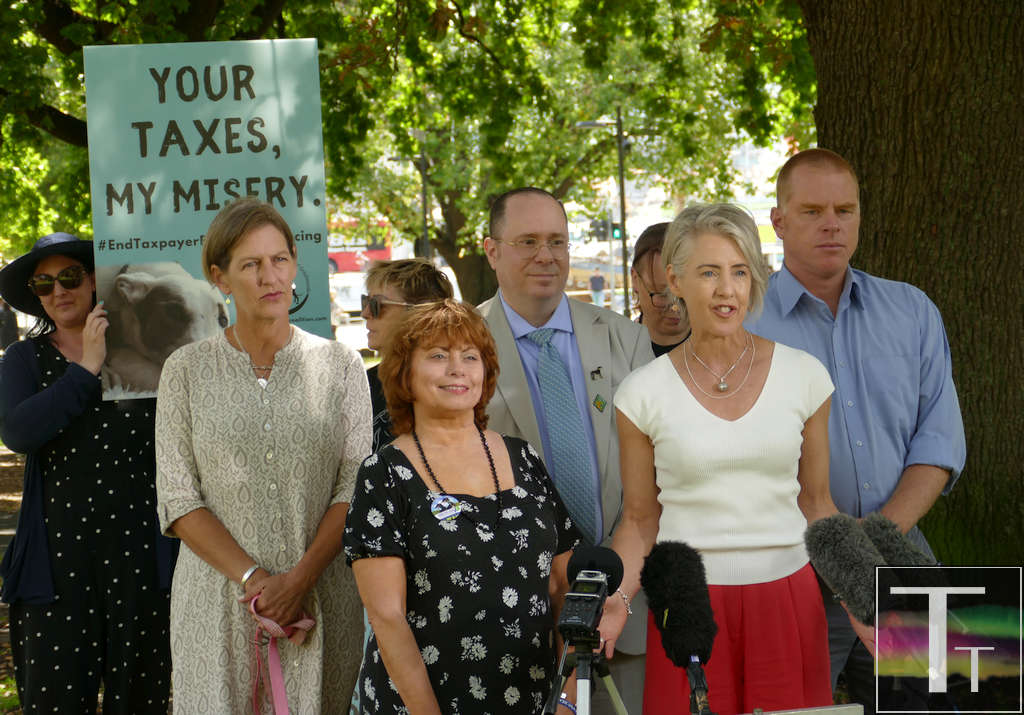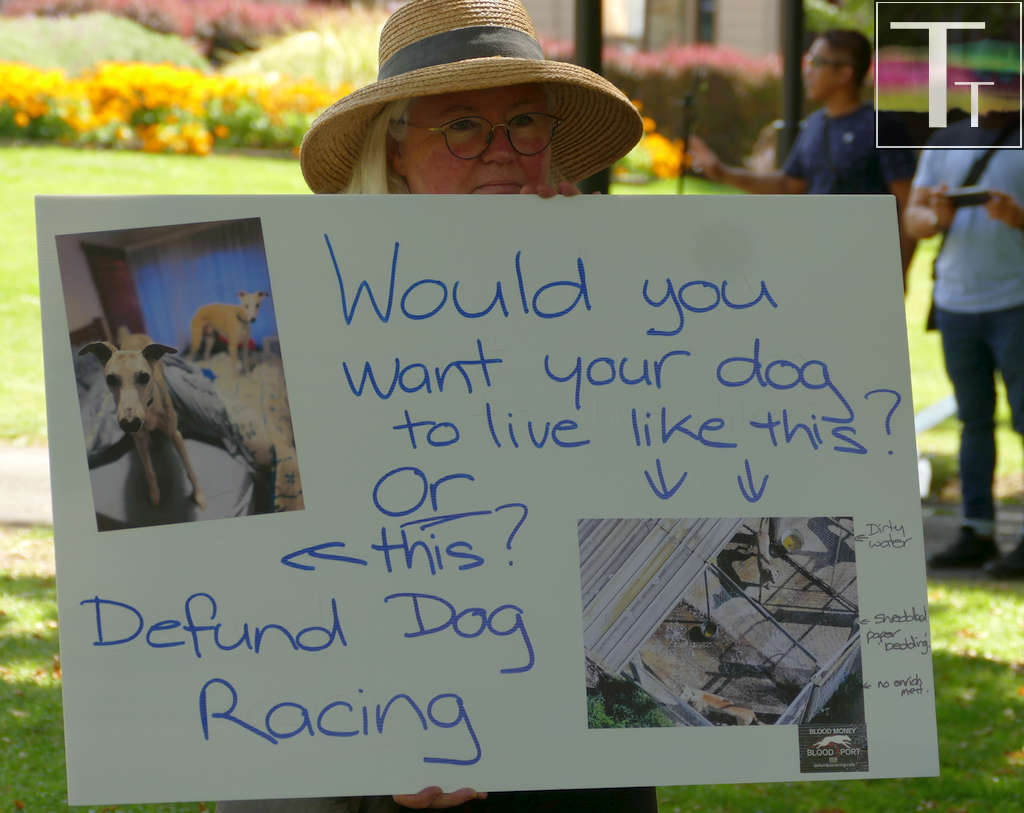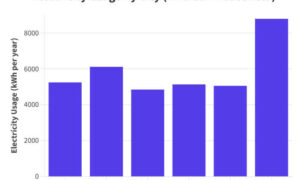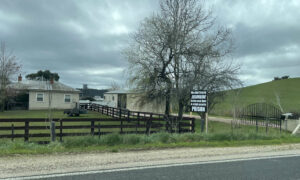Transcript of media conference with Christine Dorchak and Carey Theil, founders of GREY2K USA Worldwide, Greens Leader Rosalie Woodruff, Kristy Alger of Animal Liberation Tasmnia, and independent MHA for Clark Kristie Johnston, Parliament Lawns, Hobart, 28 February 2024.
Rosalie Woodruff
We’re here today with an enormous group of greyhound lovers with their beautiful dogs to celebrate the gentle creatures that greyhounds are. But we know every day in Tasmania beautiful dogs like these are brutalised and killed in greyhound racing. The Greens have been proud to stand on the right side of history, fighting for decades to end the cruelty that happens every day to greyhounds. And we know we’re backed by the majority of Tasmania’s who overwhelmingly want to end greyhound racing, and the subsidies that go to prop it up.
We know every day still, or despite the fact we’ve been able to stop greyhounds being killed systematically, they still die and suffer from terrible injuries on the track. So we’re here today to call for an end of greyhound racing, and to commit the Greens as a party in the next term of government to working towards that, and particularly to overhauling our animal welfare laws to make them strong so that cruelty can never occur to gentle, beautiful animals like these.
I also want to introduce two incredible people who have come here from the United States, Carey and Christine from the Grey2K movement in the United States. They have been successful in getting rid of greyhound racing in the United States. That was in 19 states and 70 different tracks, there’s now just one state left with two tracks. We are part, in Tasmania, of a global movement to end greyhound racing. Tasmania is the worst in the world for brutalising these beautiful animals. We aim in the next turn of government to be part of turning that around, ending greyhound racing for good and protecting these beautiful animals.
Carey Theil
Carey Theil, Executive Director of Grey2K USA Worldwide. It’s an incredible honour to be here today. As was said earlier, at one time there were 70 operational dog tracks in the United States, in 19 states with about three and a half billion dollars wagered. The animal protection community, both in the United States and around the world, is uniformly opposed to this industry because it’s cruel and inhumane. We are seeing advocates, everywhere where greyhound racing exists, we are seeing an active movement to end this activity.
We are here because we believe the debate over greyhound racing in Tasmania is one of the most important debates in the world. After spending the last couple of days meeting with the lawmakers who are fighting this courageous fight, and also all the grassroots activists, we are convinced that greyhound racing will soon end in Tasmania. The question is how long will it take and how many dogs will suffer and die in the meantime?
Christine Dorchak
I’m Christine Dorchak, President of Grey2K USA Worldwide. I’m here to tell everyone that change is possible. We have been working over the last 23 years to end dog racing in the United States. What we’re seeing now is an international call to end this cruelty. And Australia is so key to this fight.
We ourselves adopted an Australian dog named Brooklyn. That dog became the impetus for the global campaign to end dog racing. He was brought from New South Wales to race and die at a Chinese dog track known as the Canidrome. He and 400 dogs a year were destined to die and and just be cast aside by this cruel industry. But thankfully, we harnessed a worldwide push against that terrible cruelty. We closed the worst dog track in the world. Brooklyn came home to us, over 532 dogs joined him. So change is possible. That’s the message we’d like to bring to you today.
Journalist – Imogen Elliott
How did you manage to get so much support in the USA to force the shutdown of greyhound facilities?
Christine Dorchak
Well, the facts speak for themselves. What people understand is that these gentle dogs are kept confined for 23 hours a day. When they’re led out of their cages or their kennels to race, they suffer death and injury at every turn. And this is no way to treat a dog. It’s that simple. Everybody cares about dogs. It’s a universal feeling that we have. And to have an industry intentionally over-breeding and exploiting them is something that doesn’t belong in the 21st century.
Tasmanian Times
How did Tasmania come to be on the radar of Grey2K?
Carey Theil
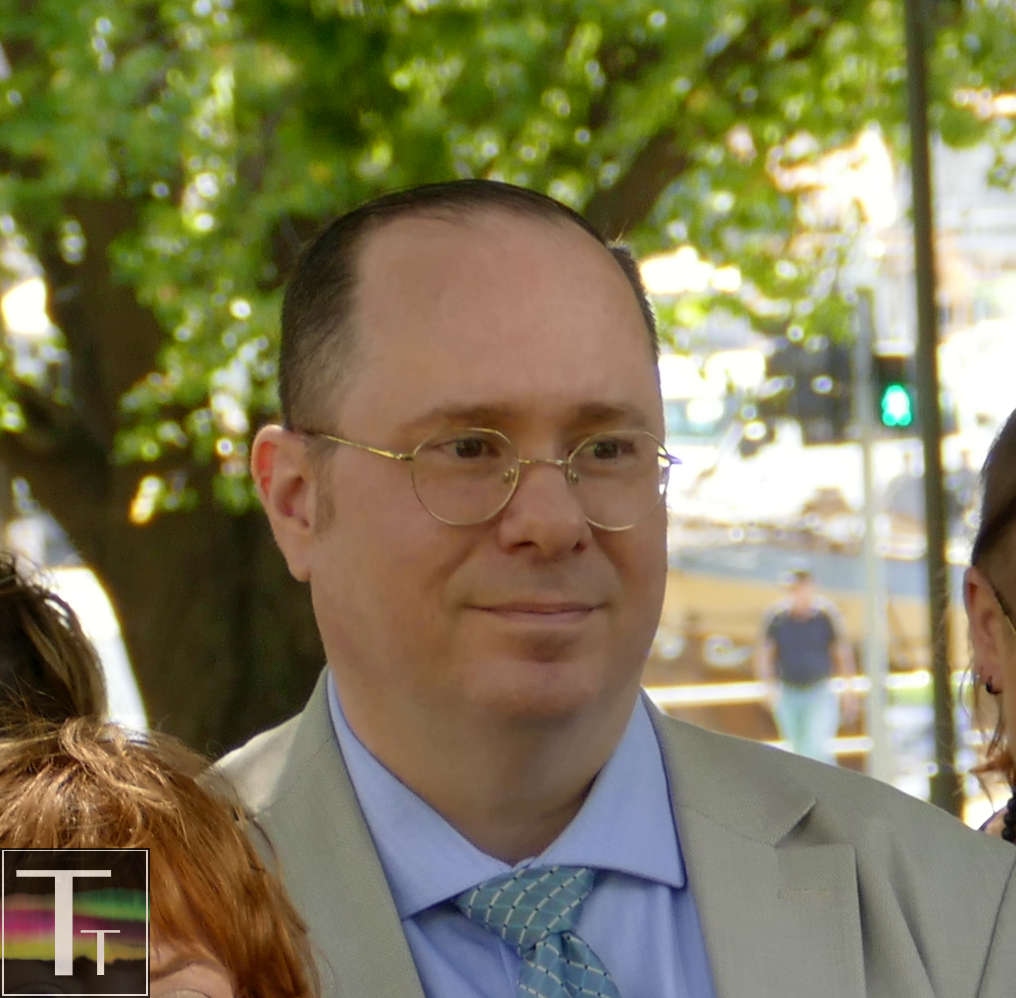
Carey Theil.
There’s been a very active debate here for a number of years, we follow that very closely. I think if you look across the world, the places we believe where greyhound racing is most likely to end in the next, say, five to 10 years, I would put Tasmania, Western Australia, Wales and Scotland on that list. We do view this as a key fight for the global movement to help these gentle dogs.
And let me also say, in the United States this issue was not a left or right issue. This was a truly bipartisan effort. We had some of the most progressive members of the Parliament, the state legislatures, joining with the most conservative members again and again and again. And we’re seeing that as well, in Scotland and Wales, a lot of cross-party support. It’s interesting to come here and see how much public support there is for an end to greyhound racing, and yet have two major parties that both continue to support something that is not only harmful to dogs, but incredibly unpopular. I think the coming election here and coming elections elsewhere will be interesting to see if there’s a political price attached to continuing to support this this cruel industry?
Journalist – Adam Langenberg
You’ve studied racing all around the world. How unusual is it that there’s taxpayer funding for greyhound racing here in Tasmania?
Carey Theil
We certainly see that in Ireland. There are massive subsidies for greyhound racing which the industry is deeply dependent on. In the United States, the final state where greyhound racing exists, West Virginia, there’s again massive subsidies. You know, this is an industry that, quite frankly, cannot survive without those types of subsidies. So this is a common theme that we see over and over again.
Tasmanian Times
The industry often defends itself by saying that one, the dogs enjoy it, and two, that it creates jobs often in regional areas where there aren’t many other options. And also on those jobs, what has happened in other parts of the world when greyhound racing has been shut down? Where have those industry participants gone?
Carey Theil
Excellent question. First of all, we have generally seen greyhound racing with a phase-out period, and with a plan for re-training of workers and allowing the industry to make a smooth transition. That certainly is the type of approach that as an organisation we support. I will say that I believe the economic claims made by this industry, in Australia and elsewhere, are overblown. And further, our economy should not be built on cruelty to dogs. I just don’t think that’s where mainstream voters are here or anywhere in the world, quite frankly.
Journalist – Imogen Elliott
What was the backlash in the US to these changes? Were there a lot of people saying that they’ve lost their jobs and [inaudible] those arguments?
Carey Theil
In the United States, this is no longer a controversial issue. Just to give you an example, the key moment in the United States was there was a referendum, a binding referendum, before the voters in the state of Florida. That was in 2018. That shuttered 12 operational dog tracks. It had been doing a billion dollars a year in business just among themselves. That passed with a 69% vote. And again, you had the most progressive political leaders in this in the state, joining with the most conservative political leaders in the state in supporting that campaign.
I think it may have been controversial or or there may have been more backlash 20 years ago, but no longer. Today greyhound racing is ending in the US and elsewhere because it simply does not fit with mainstream values about the welfare of animals. If someone came in and tried to legalise greyhound racing for the first time, with all the facts that you see around this industry, no one would support that. This is almost like in the United States. This was almost like a 1920s era relic of an industry that happened to still exist today. And just does not fit with mainstream values about the welfare of animals.
Journalist – Adam Langenberg
What’s the stat of play in the US at the moment? Are there still the two racetracks in West Virginia?
Carey Theil
As I said earlier, at its peak there were seventy operational dog tracks the United States, about three and a half billion dollars bet. Today there are two tracks left in the state of West Virginia. They only exist because they’re heavily subsidised. The company that owns greyhound racing, those two final tracks, wants to get out of the industry. There’s a federal bill that is seeking to outlaw greyhound racing nationwide, which has tremendous bipartisan support in the US Congress and we believe has a very good chance of passing. So we are living through the end of greyhound racing completely in the United States.

Christine Dorchak.
Christine Dorchak
I’d like to point out something that’s very important that we’ve seen in the United States time and time again. When greyhound racing stops, that’s not an end. That’s a beginning. These are very valuable properties. And they are great sites for employing many more people. When they are repurposed, they can be used for needed housing. We have seen such a great opportunity arise in the United States when dog tracks closed and the same can happen here.
Tasmanian Times
In Australia, there was a move by the New South Wales government to shut down greyhound racing and that was effectively overturned by pressure from the industry. Are there any cases in the United States where dog racing has been phased out or shut down where there are moves to bring it back?
Christine Dorchak
No, greyhound racing has been quite firmly looked at, voted on, closed down and then the tracks repurposed. It’s something that’s happened over and over again in the United States. Once it happened in the very biggest state, which was Florida, once the home of 17 dog tracks, when we brought the ballot question there were 12 remaining. Those facilities are all being converted into amusement centres and all sorts of great places for the public. It’s actually something that we welcome in the United States.
Journalist – Imogen Elliott
How does the standard of animal welfare [inaudible]…?
Christine Dorchak
Certainly no matter where dog racing exists, dogs suffer the same consequences. They’re kept confined for long hours each day. They suffer terrible injuries and sometimes die every time they are put out to race. There’s no way to regulate out the cruelty of dog racing. The standard of care is poor wherever dog racing exists.
Rosalie Woodruff
So it’s a minute to midnight for the end of greyhound racing around the world. Tasmanians would be shocked to know that we are the last bastion really in the world, where the majority of cruelty occurs on a daily basis to greyhounds through this racing industry. It’s propped up by Tasmanian taxpayers.
We know that 80% of Tasmanians don’t support subsidies going to the greyhound racing industry. We will work in the next term of Parliament and with any other members, including Kristie Johnston who’s here today, to to make sure that we push whoever’s the next government to end the greyhound racing industry as soon as possible.
Journalist – Imogen Elliott
Have your written to the Liberal government about this issue? Campaigned quite heavily?
Carey Theil
I don’t know that that’s our place, quite frankly, I think we’re here to provide solidarity and support to the amazing people who are fighting for greyhounds here. But I think it’ll be interesting to see. I don’t understand political parties continuing to double down on an industry that has so little public support. Just as someone who has worked on this issue and followed policy and politics for many years, that seems to me a strange choice.
Tasmanian Times
Your organisation Animal liberation Tasmania has done a lot of work on exposing conditions at greyhound trainers’ properties particularly. What’s been the response from ordinary Tasmanian and how would you compare that to the response from Tasracing to trainers that don’t appear to be treating their dogs well?
Kristy Alger
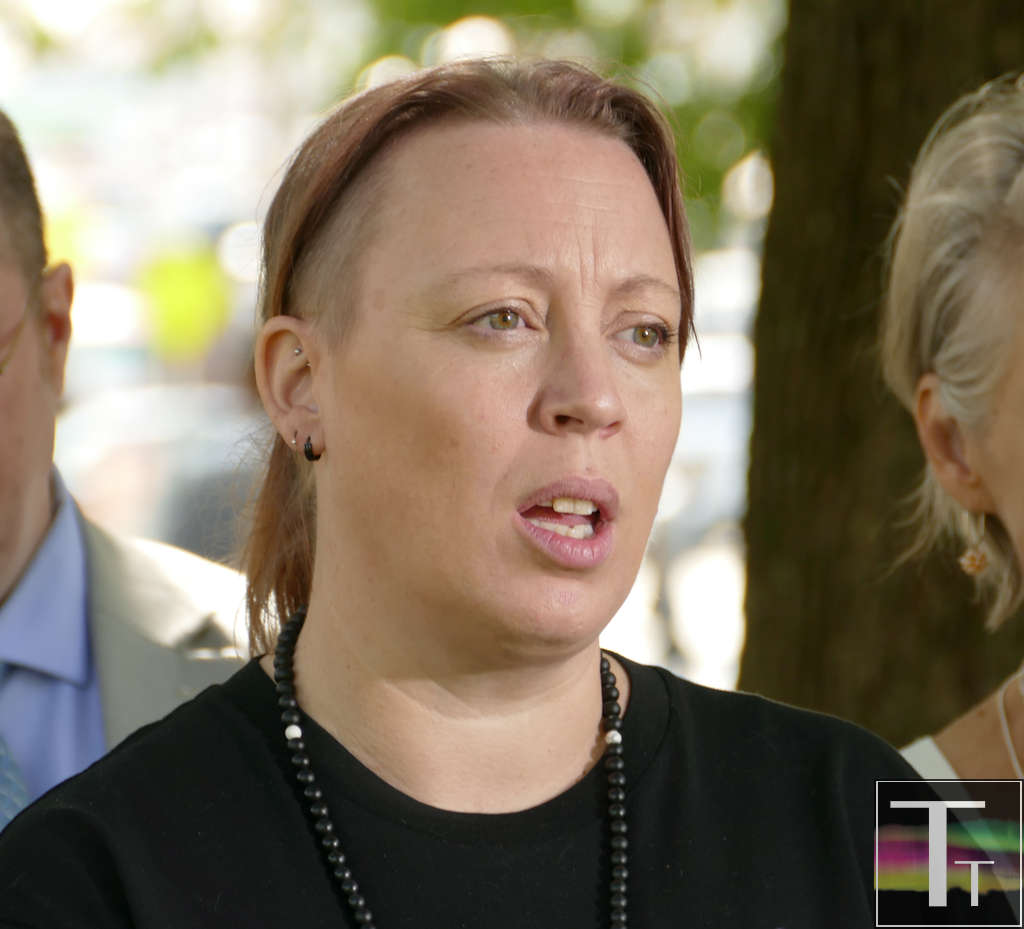
Kristy Alger.
What we’ve seen, across the investigations that we have broadcast has been a pretty damning indictment on the industry with the trainers keeping dogs in poor conditions. The average Tasmanian would not view these kennelling situations as something that they would approve of for their own animals in their care. We’re seeing consistently poor bedding quality, we’re seeing wood that is chewed on. We’ve seen wood that is covered in bird excrement. We’re seeing in many properties, green water buckets, with days of built-up algae.
What we have found really interesting is there does not appear to be much loyalty between greyhound trainers. So when we expose a trainer, their close community – their family and friends network – tends to turn out for them and have a go at us. But generally speaking, they don’t go into bat for one another. Anthony Bullock surprisingly doesn’t have that much support in his own community. We have had multiple trainers actually messaging us saying that they couldn’t believe that he returned to the racing track and were appalled at the decision. So there are no loyalties between trainers, and they’re all very happy to point the finger at one another.
But the issue is that they’re all complicit together in this. Last night we watched as Tilka’s Angel repeatedly tried to escape the box at the Hobart meet. And she was thrown into that box by three people. Everybody at the track watched as she was pushed and shoved and thrown into the box that she was so clearly resisting entering. Everybody stood by and let that happen. So they might not be loyal to one another, but they are complicit in this with one another.
Journalist – unidentified
How do you feel knowing that [inaudible] …?
Kristy Alger
Nothing ceases to surprise me anymore. There are areas in the US where your animal welfare laws are so woeful, when you look at farmed animal legislation, for example. But what we’re seeing with the greyhound fight in the US is so heartening, and to hear Carey say that this is where the fight’s that, Tasmania is where the fight’s at, that is really, really heartening to hear because it means that we are actually gaining traction, and we will win this.
Journalist – unidentified
Do you think this is an issue that people will be prioritising in the lead up to the election?
Kristy Alger
Animal welfare in general is something that people are going to be prioritising. I think it’s not just the greyhounds. It’s the harness industry, it’s the thoroughbreds. It’s the slaughterhouses. And now last night with a new release of footage from Farm Transparency Project, it’s the dairy farms in Tasmania as well that are coming under scrutiny. Wherever cameras are pointing, were seeing horrific cruelty.
Kristie Johnston
What are we seeing clearly during this campaign is that the community are speaking out with heart, particularly following last Thursday night’s disgraceful racing meeting at Elwick. In extreme heat, where despite community outcry, Tasracing continued to race their greyhounds. Now it’s going to take some time sadly before we find out what the tragic results have been from that particular race meet, because Tasracing, and the Office of Racing Integrity, lack integrity, to be clearly and transparently providing outcomes from those particular race meets.
The community are disgusted and they are speaking as one. They want an end to this industry. It is cruel at its heart and lacks integrity. But both major parties are deaf to this particular issue. I suspect when they come to door-knock households around the state Tasmanians will be saying to them, ‘you need to govern with heart and with integrity. And you can show that by closing down the Tasmanian racing industry.’
Journalist – unidentified
Do you have hope that will eventually shut down the racing industry?
Kristie Johnston
I have great confidence in the community speaking out and the wonderful advocates that we do have. I know that from right around the world, as Christine and Carey have just said, people have has spoken out and they’ve been successful in shutting down this cruel industry. I have every confidence that Tasmanians can do it. It might take time. But we will get there because we believe strongly in integrity and in making sure that we treat our animals humanely. It’s just unfortunate that the two major parties are very slow take this message up.
Journalist – Imogen Elliott
In terms of that race meeting last week, what are your concerns about what the outcomes might have been as a result of it going ahead?
Kristie Johnston
We experienced extreme heat last Thursday, and those poor dogs were stuck in trailers, in small trailers with very little ventilation. They were forced to race in extreme heat conditions. I fear that some may have died as a result of sheer exhaustion, of heart conditions, who may have been injured. We know that racing inherently is dangerous, but when you put them into those extreme weather conditions, it becomes lethal. That is not an acceptable outcome.
The community are outraged about it. As I move about Glenorchy, particularly this last couple of days, people have been asking me ‘surely they didn’t race those poor dogs?’ And when I tell them that absolutely they did, they put profit ahead of animal welfare every time, they are disgusted.

